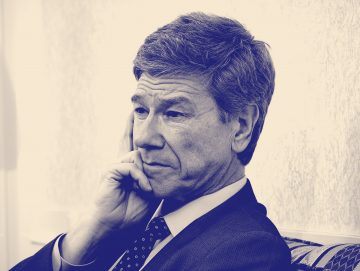Isaac Chotiner in The New Yorker:
 In the early nineties, the economist Jeffrey Sachs was known as a “shock therapist,” for advising the Soviet Union on its controversial transition to a free-market economy. Since then, Sachs has shifted his focus to poverty alleviation and international development, becoming one of the most visible academics in the world. His book “The End of Poverty,” from 2005, imagined a globe free of the worst forms of destitution; Sachs also attributed misgovernment in much of Africa to poverty, rather than the other way around. (This thesis was much debated by other economists and development experts who were more skeptical about the impact of foreign aid.) From 2002 to 2016, Sachs was the director of Columbia University’s Earth Institute; he is currently a professor at the university and an adviser to the United Nations. He endorsed Bernie Sanders for President in January and has occasionally advised the senator.
In the early nineties, the economist Jeffrey Sachs was known as a “shock therapist,” for advising the Soviet Union on its controversial transition to a free-market economy. Since then, Sachs has shifted his focus to poverty alleviation and international development, becoming one of the most visible academics in the world. His book “The End of Poverty,” from 2005, imagined a globe free of the worst forms of destitution; Sachs also attributed misgovernment in much of Africa to poverty, rather than the other way around. (This thesis was much debated by other economists and development experts who were more skeptical about the impact of foreign aid.) From 2002 to 2016, Sachs was the director of Columbia University’s Earth Institute; he is currently a professor at the university and an adviser to the United Nations. He endorsed Bernie Sanders for President in January and has occasionally advised the senator.
I recently spoke by phone with Sachs about the coronavirus and the challenges that the crisis poses to international coöperation and the world economy. In our conversation, which has been edited for length and clarity, we also discussed the root causes of American decline, why some poorer countries have so far avoided large outbreaks, and how Donald Trump has failed to meet even the low expectations that internationalists have for the United States.
More here.
